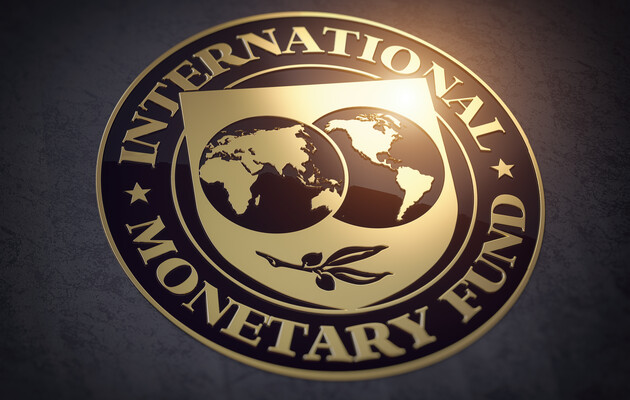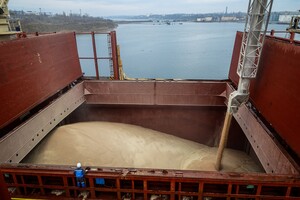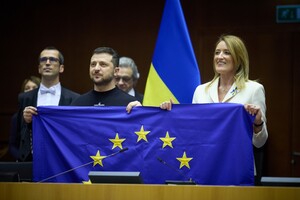HEADLINE: At the start of a new program with the IMF
On February 20, in addition to Joseph Biden, the head of the IMF, Kristalina Georgieva, visited Ukraine. During a meeting with the President of Ukraine, Ms. Georgieva highly appreciated the activities of the country and the authorities, which are functioning well in the conditions of a full-scale invasion. In addition, during her visits to the Prime Minister and the Minister of Finance, the details of further cooperation with the Fund were discussed. They were talking about launching a new multi-year program worth more than 15 billion dollars, which will consist of two parts: immediate financial support and support for structural reforms that will contribute to the recovery of the country.
In this context, we can speak about a certain departure from the standard practices of the IMF, which usually does not lend to countries in a state of war. In this way, Ukraine is literally changing the world, including such a conservative institution as the International Monetary Fund. Another question is to what extent the specified volume of the future program corresponds to Ukraine's needs for economic recovery — for comparison, the agreed volume of the extended financing program for Greece in 2012 was 28 billion euros, or 36 billion dollars. It is worth noting that our need for additional external financing to cover the budget deficit in 2023 reaches 10 billion dollars. However, the IMF has always been valuable not so much for money as for institutional support and promotion of reforms. What happened this time?
Judging by several posts on Facebook, the meeting of the IMF delegation with the staff of the National Bank of Ukraine was the warmest and most informal. The head of the NBU thanked the partners for their trust, offered an excursion tour of the bank, including the shelter and rooms for employees' children, and presented the guests with coins.
During the meeting with the NBU management board, Kristalina Georgieva outlined three priority areas for further cooperation: strengthening the efficiency of the institutional system, in particular tax administration and spending prioritization, continuing banking sector reforms, and creating better conditions for the activation of the domestic debt market.
The opportunity for such meaningful meetings was created a few days before in Warsaw during the joint work of the IMF mission and representatives of the Ukrainian authorities regarding the assessment of Ukraine's fulfillment of the conditions of the Monitoring Program.
According to the results of the discussions, the IMF reported that the implementation of the Monitoring Program by the authorities of Ukraine was highly efficient: all quantitative and indicative targets were achieved, and all structural milestones were met. Therefore, agreements were reached at the expert level regarding the first and final revision of the Monitoring Program. These arrangements, once approved by IMF management, pave the way for the start of negotiations on a full-fledged financing program.
However, a careful reading of the relevant IMF press release gives reason to talk about the differentiated attitude of the Fund's staff to different areas of Ukraine's economic policy, and therefore to different government institutions.
On the one hand, the IMF gives quite clear recommendations regarding the nature of fiscal policy in 2023: increasing tax revenues (including by improving revenue administration and returning the tax policy to pre-war conditions), expanding the issuance of securities on the domestic debt market to eliminate dependence on emission financing.
On the other hand, the IMF does not make any recommendations in the field of monetary policy. More precisely, the press release actually contains only approval of the NBU's actions and intentions.
The National Bank of Ukraine (NBU) responds in a balanced manner to the excess liquidity in the banking system, including by increasing the required reserve standards, and to the need to increase the attractiveness of assets in the national currency in order to maintain price and external stability. Since the beginning of the war, large-scale emergency measures imposed under martial law have helped to maintain financial stability. Currently, preparations are underway for the gradual cancellation of emergency measures in order to bring domestic regulations in line with international standards. The NBU's priority is to update the strategy of the financial sector, the key element of which will be, under favorable conditions, an independent assessment of bank assets.
But what about the National Bank interest rate policy? Do IMF experts seriously consider the rate of 23% per annum for NBU deposit certificates a "considered reaction"? If so, why is the fact that central banks pay 4% for similar transactions causing outrage in developed countries?
It is worth noting that not only the above press release, but also the Memorandum on Economic and Financial Policy, which outlines Ukraine's obligations within the Monitoring Program, and therefore is agreed with the IMF, shows that the Fund fully supports the policy of the NBU.
In general, it can be said that the "leitmotif" of the Monitoring Program is the activation of domestic borrowing in order to avoid emission financing of the budget deficit. That is, it is quite a worthy goal. However, the Memorandum also defines the methods by which it is planned to increase the volume of government bonds, and the main thing among them is to increase the yield on government bonds on the primary market.
Encouraging banks to buy government bonds in the context of raising reserve requirements is a temporary tool, the potential of which will soon be exhausted.
In other words, the Monitoring Program actually legalized everything that the NBU had been demanding from the Ministry of Finance of Ukraine since the spring of last year, first verbally, and then by raising the discount rate to 25% (and rates on deposit certificates to 23%).
Thus, under the influence of the mentioned actions of the NBU, the average income of hryvnia government bonds on the primary market increased from 10.3% in May (with a monthly placement volume of UAH 27.2 billion) to 17.3% in December 2022 (UAH 23.6 billion) and continued to grow at the beginning of 2023.
A telling point: while in 2022 the expenses on servicing the state debt amounted to UAH 157.9 billion, or 5.8% of the total volume of state budget expenditures, the budget for 2023 provides for an increase in such expenses to UAH 326.3 billion — 12.6 % of total expenditures. It should be emphasized that the mentioned amounts reflect only the interest that the state pays on debt obligations, and somewhere there is also the "principal amount of the debt".
Is it normal for a country that is in a state of full-scale war to steadily increase debt service expenditures, that is, to redistribute funds in favor of financial intermediaries?
It would seem that the answer is obvious, but not to the NBU staff. It is worth noting with regret that neither elementary logic, nor the example of the US Federal Reserve System during the Second World War, nor even the authority of J. M. Keynes (who insisted on the need to reduce the cost of public borrowing in wartime conditions) is able to overcome the NBU's irrational desire to "increase the attractiveness of hryvnia assets."
Important note: there is no conclusive evidence that high interest rates will prevent inflation, since it is caused mostly by unpredictably high supply, and demand is already quite low (due to migration, falling incomes and rising unemployment).
Thus, if the goal of the policy was indeed to increase the volume of domestic borrowing, then this could be easily achieved by lowering the rate on NBU certificates of deposit, which would increase the relative attractiveness of investments in government bonds for banks.
Even the Memorandum (paragraph 25) openly states that the level of rollover (the ratio of new borrowings to payments on government bonds) decreased from over 100% in March-May to 22% in August-September. However, what fundamentally distinguishes these two time periods? That's right, the level of the NBU discount rate.
In order to expand opportunities to raise funds on the government's domestic market (together with the NBU), it would be worthwhile to simplify the access of individuals to the purchase of military bonds as much as possible, up to the removal of private intermediaries from the process. In addition, it would be worthwhile, at a minimum, to remove institutions owned by citizens of the Russian Federation from among the intermediaries.
Apart from that, it would be advisable for the government to consider the possibility of paying part of the wages of highly paid public sector employees with military bonds. This approach has been repeatedly used by various countries in difficult times.
That is, if the declared goal — in our case, the avoidance of emission financing of the budget — really meets the aspirations of all participants in the process, then a solution will always be found. In this case, the IMF itself, of which the state of Ukraine is a member, and not only its central bank, could significantly contribute to the search for such an optimal solution.
Why does the IMF give a marked advantage to the central bank over the government? This question currently remains unanswered. An explanation may be found both in the mandate of the Fund and in its commitment to the "orthodox" approach in the fight against inflation with the help of high rates. However, the answer can be much more prosaic: the IMF is the top of the global corporation of central banks, therefore, it acts in the interests of the members of this corporation. Unfortunately, these interests come at a high cost.
Read this article in russian and Ukrainian.
Please select it with the mouse and press Ctrl+Enter or Submit a bug















 Login with Google
Login with Google